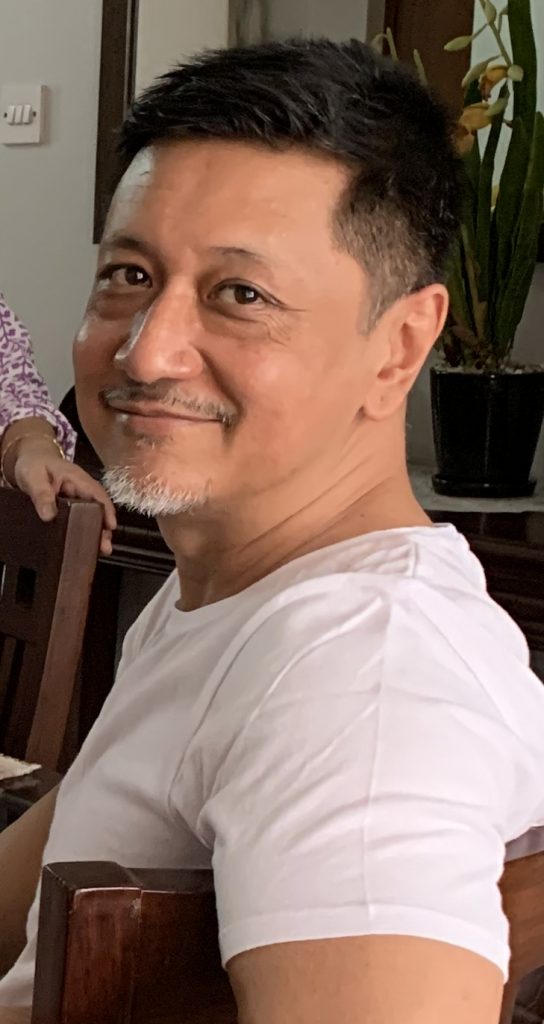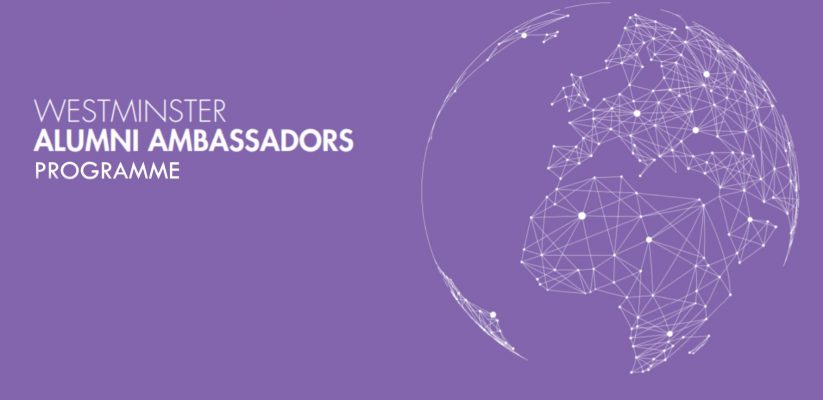Our Alumni Ambassadors
We have alumni from almost every country. And so, to help us keep in touch with graduates in nations outside the UK, and to help us represent the University in countries around the world, we have appointed our International Alumni Ambassadors.
Our Ambassadors are active and responsive volunteers, whose key objective is to increase the engagement with Westminster in their respective country or region. They support our reputation, increase international student recruitment and dedicate their time to enhancing the student experience with their global perspectives.
As well as engaging with the various programmes we run – such as mentoring and Westminster Working Cultures – our Ambassadors volunteer at international recruitment fairs, share their experiences with prospective students and are always on-hand to provide us with quotes or videos for university content.
In each ‘Ambassador Bulletin’, we celebrate the dedication of our ambassadors by highlighting some of the work they are doing to support the University.
This time, we speak with Kapil Tamot, (Public Communications and Public Relations MA, 2002), volunteer, mentor and Alumni Ambassador for Nepal.

Can you tell us a little bit about your time at Westminster and can you pinpoint any highlights from your student days?
I have no one answer because there were so many highlights of my time in London.
Some of the closest friends that I have are from the University. They are all over the world and we keep in touch, even after 20 years and we have a big pleasure in catching up.
From an academic point of view, I was fortunate to be able to go and listen to Alastair Campbell. He used to be Director of Communications of Prime Minister Tony Blair and he was called a ‘Spin Doctor’. Because the Masters that I was doing was in Public Relations and Communications, one of the first lectures that we had at university was on Spin Doctors. The best example of a Spin Doctor happened to be Mr Campbell and I was fortunate enough to be able to attend the speeches that he was giving, and the University made that possible.
One highlight, which will remain in my life as a memory that I will never forget, and I talk about it with my son: It was in 2002 when Tony Blair, Prime Minister of the UK at that time, decided to work with the Americans to attack Iraq. There were huge protests all over the UK and especially in London – huge student protests.
And I was a part of it. It was cold and we were young, and we didn’t believe in that war. It was such an event, such a moment of my life that it still brings tears in my eyes. When I think about this, that there was such a movement, and I was part of it. As a Nepali, I was able to protest against a British Prime Minister in his country. That was such a highlight for me.
Why did you want to become an Alumni Ambassador for Nepal and how did how did that come about?
I was in touch with the Alumni Team and I got an email which talked about creating alumni associations in different countries.
I came to UK for my Masters as part of a Chevening Scholarship, so I was already part of the Chevening network. So I said ok. I thought it would be great to find people who went to the same college and sat in the same classes and took the tube to go all the way to Harrow and partied at the same pubs, and so many kilometres away from London. So many thousands of kilometres away from London.
We are a very small group fromNepal, we are less than 10 and most of them are not based in Nepal. We managed to gather a few times… But then came COVID. And since, for over two years now, we have not been able to do anything. We need to get back and get our act together again to reunite!
As well as being an ambassador, you’ve been an active mentor for the University. Tell us about your experience as a mentor on our Future Ready Mentoring programme.
I have found the experience of being a mentor a kind of a fact-check of your experience, of your knowledge. Mentoring someone is quite an intense task, in fact. I had never done this before – I had taught, I used to be a teacher – but I had never had a relationship with someone in this way, where the student/mentee is looking up to you. So that is a kind of a test of your personality, test of your experience, your knowledge base; a test of how much you can bring to someone.
So, in that way, I think it is beneficial for everyone if they can do it. It requires time, it requires patience, it requires understanding someone. This helps me a great deal in growing myself.
I think the mentees were thankful, not only in terms of the academic input that I was able to provide. I think because I belong to a slightly different culture, I have the values that I grew up with, which are slightly different to the values that are in Europe. So, in that sense, it becomes very interesting and rich for someone to understand things from a different persepctive.
What advice would you have for any recent graduates looking to start a career in business?
One statistic. It’s a global statistic, and it’s not coming from me. It is coming from an organisation called Start Up Nation. They say: only 0.07 percent of business start-ups grow. Which means out of 1,000 businesses, only seven will cross the stage to become a business that has future prospects.
What does that mean? It means the success level is very, very, very low. Which means business is not glamorous at all! Which also means you need to be extremely clear about what you want and how you’re going to get there, and have a good plan to get there.
You need to be ready to have that level of patience. You need to have an understanding of difficulties and you need to have that personal capacity to manage those failures without becoming frustrated.
It is a big test. The point is, for those who start, it’s about the clarity of their vision. It’s about being able to formulate a plan, have a plan if that plan fails and having the capacity to deal with it.
For those who want to grow, this is a whole new ballgame, because when a business grows, what becomes important is no longer the worry of making money to survive, or a worry for growing your business. The worry is more about how to manage that growth.
To be able to manage something that grows, you need to grow at the same time. So, my advice – or, it’s more of sharing my experience as an entrepreneur – is: We need to develop our inner capacity as the businesses grow. I don’t want to go into a course of entrepreneurship here, but this is something very, very important to think about, for fellow entrepreneurs of Westminster.
What advice would you give new graduates looking to commence a career in communications?
Communications is not about one skill.
A lot of people think communications is all about delivery. But I think communications is much more than that. It is a combination of many skills. You need to understand and analyse things quickly, to be able to put it out in a way that people understand and get influenced by what you say. You need to have that capacity of analysis. And that analytical capability only comes from the knowledge, understanding and openness to different aspects of life, whether it be political or economic, social, geopolitics or anything. It’s a kind of a melting pot of many skills.
The second thing I would say is communications is ever-evolving. When I was doing my Masters, we had no idea about what was coming today, with the social media. We had no idea how we would communicate today.
Twenty years ago, making a video was a big deal. You needed two or three people, at least, to make a video. Now everyone can make a video alone.
So, the only thing that I would be able to say to those who want to go into communications is to be absolutely in tune with what is happening and adapt your style accordingly. If you don’t, then you are obsolete very, very quickly!
What impact do you feel studying abroad had on your own career?
This answer joins the previous question. Because in communications, what is very important is understanding what and how the person that you are trying to communicate with will think.
What I learnt by studying abroad is understanding people. London allowed me to meet and understand so many people from different walks of life, different cultures and different places. It was very rich.
However good you are at something, if you don’t have the capacity to deal with people, what you can do in life could be limited.
How does the working culture of Nepal differ from that in the UK?
The difference is so huge! Simply because, I come from a country where Buddha was born. Buddhism is a part of our everyday lifestyle, and we also have Hinduism that has 33 million gods… 33 million gods! Can you imagine?! We are only 30 million people. What does it mean? Everything is a God. So, from that aspect, you can only imagine everything is very different.
We don’t have the word ‘cousin’ because we consider the children of your parents’ siblings to be your own siblings. So, in terms of relations… it’s not the same thing.
In English, you have 26 letters. We have 46 letters. So, the way we say things are different.
If you meet people, in the street, which happens all the time because everyone knows everyone. ‘How are you?’ is rarely asked (In Nepal). People ask you, ‘where are you going?’ If you ask someone in London, ‘where are you going?’ The answer could be: ‘It’s none of your business!’ But in Nepal it’s not a problem for people to say where they are going. And people may ask again, why are you going there? Who are you meeting? you know! All sorts of things. Can you imagine that in London?
So yes, the differences are huge. But in the end, having worked in several countries and having had the chance to travel around the globe a bit, I think despite the differences, we all live in the same way. We all have dreams. We all have some aspirations; we all have similar priorities, and we all try to achieve the same thing. But the journey of how we get to that point is different.
- Peter’s Blog to Alumni - 27 January2026
- Could you mentor a Computer Science student this February and March? - 7 January2026
- India Alumni Survey Results - 27 October2025
